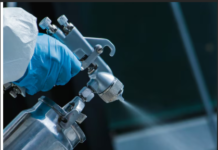What is Self Cleaning Window Glass?
Self cleaning window glass is a specially treated glass surface that stays cleaner for longer by breaking down dirt and allowing rainwater to wash it away. Unlike traditional glass, which requires frequent manual cleaning, this glass features a microscopic coating of titanium dioxide that reacts with sunlight and water to clean itself naturally.
The technology behind it is based on two key processes:
- Photocatalytic action: UV rays from sunlight break down organic dirt and grime.
- Hydrophilic action: Water spreads evenly across the surface, forming a thin sheet that washes away loosened dirt instead of leaving droplets or streaks.
This makes self cleaning glass ideal for high-rise buildings, skylights, conservatories, or any windows that are difficult to access or clean regularly.
Why is Self Cleaning Window Glass Important?
In modern architecture and home design, large glass facades and expansive windows are popular—but they come with high maintenance needs. Self cleaning window glass offers a practical solution:
1. Reduces Maintenance Time and Costs
Manual window cleaning, especially on multi-story buildings, is time-consuming and expensive. Self cleaning glass reduces the frequency and intensity of cleaning.
2. Improves Aesthetic Appeal
Always having clear, spotless glass improves the look of homes and buildings, maintaining curb appeal and enhancing views.
3. Eco-Friendly Option
Using less water and fewer cleaning chemicals makes self cleaning glass a more sustainable choice.
4. Long-Term Durability
The titanium dioxide coating is durable and weather-resistant, maintaining effectiveness for years.
How to Use Self Cleaning Window Glass Effectively
To get the most out of self cleaning window glass, follow these tips:
Proper Installation
Ensure the glass is installed in areas that receive ample natural sunlight and occasional rain. This activates both the photocatalytic and hydrophilic processes.
Regular Light Rinsing
In dry climates, rinse the glass occasionally with a hose to remove loosened dirt, especially in dusty or polluted environments.
Avoid Abrasive Cleaners
Do not use harsh chemicals or abrasive materials that could damage the self cleaning coating.
Use on Strategic Surfaces
Apply it on difficult-to-reach windows, glass roofs, or large facades where manual cleaning is costly or unsafe.
Common Mistakes to Avoid with Self Cleaning Window Glass
1. Using Harsh Chemicals
Strong cleaners or rough tools can damage the special coating. Use only water or mild detergent when necessary.
2. Assuming Zero Maintenance
While the glass reduces cleaning needs, it doesn’t eliminate them entirely—especially in dusty or dry areas with little rainfall.
3. Poor Placement
Installing it in shaded areas or places sheltered from rain limits its self-cleaning effectiveness.
4. Neglecting Manufacturer Guidelines
Always follow the care and installation instructions provided by the glass manufacturer.
Conclusion
Self cleaning window glass is a modern innovation that combines science and convenience. Perfect for homes, offices, and high-rise buildings, it reduces cleaning effort, saves money, and contributes to a cleaner environment. If you’re planning a renovation or new construction, investing in self cleaning glass is a decision that pays off in both functionality and aesthetics.
Looking to upgrade? Speak with a glazing expert or glass supplier to find the best self cleaning glass for your needs.
FAQs About Self Cleaning Window Glass
1. How long does self cleaning window glass last?
The coating is designed to last for 10 to 20 years with proper care.
2. Can I install self cleaning glass on existing windows?
No. The self cleaning layer is factory-applied during manufacturing. However, self cleaning window films are available as alternatives, though less effective.
3. Does it work without sunlight or rain?
Sunlight and rain are essential. In dry or shady areas, occasional rinsing may be needed to maintain cleanliness.
4. Is it more expensive than regular glass?
Yes, the upfront cost is higher, but it saves on long-term cleaning expenses and maintenance.
5. Does it remove hard water stains or mineral deposits?
No, it primarily breaks down organic dirt. Hard water stains may still need occasional manual cleaning.
6. Is self cleaning glass safe for all buildings?
Yes, it’s widely used in residential and commercial properties, including skyscrapers, schools, and hospitals.
7. Can it be used in bathrooms or interiors?
It’s designed for external use where sunlight and rain activate its properties. It’s not effective for indoor glass.
Stay up to date with the latest trends and innovations at Space Coast Daily UK



